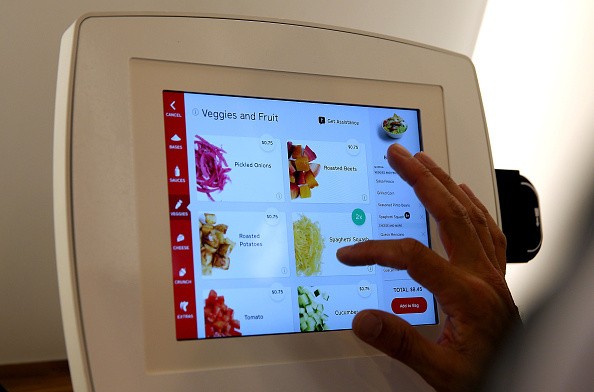Automated restaurants are the new idea of a Colombian fast-food chain amid the coronavirus pandemic.
A Colombian fast-food chain turns its old branches into automated restaurants since the pandemic slammed the foodservice industry across the world. MUY, a Colombian fast-food chain, has four restaurants in Mexico City and 30 restaurants in Bogota, as per Deccan Chronicle. Earlier this month, MUY opened the first "contactless store" in a commercial district in Bogota. Many restaurants in Bogota have been forced to shut down due to the ban on sit-down dining.

The main lobby of the automat is lined with colorful touch screens where customers tap their food order. On another screen, it states people when their order is ready and will lead them to small cubicles where they can pick up their meals in bags. A machine will take payments in cash or debit cards from the customers.
Felipe Sanchez, a publicist who has been visiting MUY restaurant twice a week, said that the new way of ordering food in MUY is convenient. "I think they have continued to guarantee the quality of the food while implementing new safety measures," Sanchez said.
According to the Business Inquirer, MUY serves freshly cooked rice bowls, which includes proteins such as strewn beef and grilled chicken. MUY also has vegetables and Colombian favorites like red beans, chorizo, plantains, and pork rinds.
The company used touch screens since it was founded in 2018. And the company says that even if the pandemic hadn't broken out, they planned to transition to contactless stores. Jose Guillermo Calderon, MUY's CEO, said, "The technology helps us make our service faster and make it more personalized."
Calderon explained that the computers collect data on customers' orders so that their favorite meals will quickly show up on the screens the next time they visit. The machines also track each ingredient's requested amount to help the company avoid purchasing more than what it needs.
According to Caldero, a traditional restaurant can throw away up to 30% of food, which MUY has cut down 2.7% of it. The amount lessen is still a lot but definitely lesser than the rest of the industry.
Back in the late 19th and early 20th centuries, automated restaurants existed when entrepreneurs in the United States and Germany buy eateries called "automats" that sold meals using large vending machines that took coins. The vending machine in the U.S shut down in the 1980s.
Some of the automats remain in the Netherlands, and a restaurant with contact-free system opened in Argentine capital of Buenos Aires in 2018. According to Business Inquirer, the attempts to launch automated restaurants using touch screens in the U.S have limited success. Boston eatery, Spyce, used robots to cook meals that have shut down in November to change its menu but has not reopened. In 2015, Eatsa was launched in San Francisco, another automat closed its branches in 2019 and changed its name. Eatsa now focuses on developing software.
MUY is adapting to the pandemic by making it easier for the customers to order food from home through an app. However, MUY keeps its costs low by allowing humans to cook meals and not have robots to do it. CEO Calderon explained that the chain sells about $1 million monthly to its more than 30 branches. The sales are already recovering to pre-pandemic levels, as per Calderon.
The Colombian fast-food chain hopes to portray itself as a biosecure place. MUY assigned an employee at the entrance to greet each customer alongside a sanitizing gel. The disinfection of touchscreens is scheduled at regular intervals.
Check these out:
Food Insecurity Rises Due to COVID-19 Economic Fallout
KFC Donates One Million Pieces Of Chicken To Help Feed Teachers
FDA Recalls Lemons, Limes, Oranges, and Potatoes Due to Potential Listeria Contamination
© copyright 2024 Food World News, a property of HNGN Inc. All rights reserved. Use of this website constitutes acceptance of our terms and conditions of use and privacy policy.



